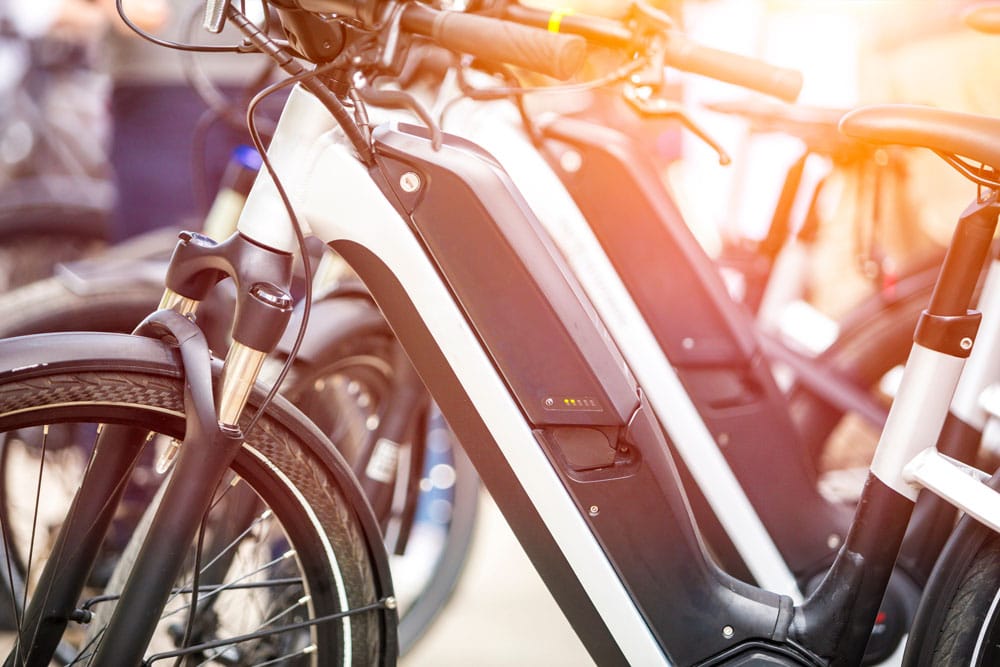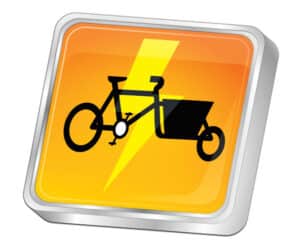Mobility & Tech
Mobility & Tech
E-Bikes Need More Investment

stock.adobe.com / mmphoto
Tackling the climate and air pollution crises will require changes to transportation. Transportation is one of the most challenging sectors to decarbonize due to its heavy fossil fuel use and reliance on carbon-intensive infrastructure, such as roads, airports, and the vehicles themselves. Current approaches to reducing climate impacts from transportation rely on increased usage and adoption of electric cars. However, cities can diversify their approach to reduce transportation emissions relatively quickly by swapping cars for active transportation: cycling, walking, e-biking, and e-scooters.
Shifts in transportation should not only be viewed as they relate to climate change, but also with intentionality toward equity and affordability. Transportation is the second-highest household expense after housing. Lowering this expense allows households to spend money on other needs. Limited mobility options impact residents and employees, restricting the economy and quality of life in our communities.
Transportation and mobility need to adapt to more rapidly advance improvements to transit, biking, walking and increased mobility options. Communities across the country are wrestling with challenges in creating a transportation system to better address equity challenges and better connect residents and employees to transportation and reducing climate impacts. Electrified options like shared e-bikes, e-scooters and e-assist cargo bikes could provide a more cost-effective, faster way to reduce the climate impacts from transportation.
Grand Rapids Shared Micromobility Program
Scooter and bike share (also called shared micromobility) services provide solo, low-cost transportation options on-demand. They are intended to connect with other transportation services like transit, parking, park-and-ride, and ride sharing. Shared micromobility services fill gaps in transportation options due to transit service changes, increased risks of carpooling and ride sharing, or the cost of personal automobile use. Service is available before and after current transit service hours to support trips to and from transit stops.
Micromobility increases transportation options for those who are least likely to own a car and is potentially most beneficial to people who are least likely to be able to afford privately-owned vehicles. Yet, without a distribution requirement, private companies may not make the effort to locate in all areas of the community. Cities need to meet the needs of all users, and support of bike and scooter share services are critical components. A key is actively bringing private mobility companies and communities together to ensure that equity considerations are included within all forms of mobility.
The City of Grand Rapids initiated a scooter share pilot program in Fall 2020 and since has deployed e-scooters and e-bikes in a 12 square-mile area including downtown, neighborhoods, and business districts. The pilot served 74% of underserved neighborhoods to evaluate how shared micromobility services can contribute to Grand Rapids’ multi-modal transportation system. The City contracted with two vendors to offer services through June 2022 with up to $400,000 in City funding.
The City also intentionally focused the pilot on providing mobility services to the Neighborhoods of Focus (NOFs), 17 census tracts in the near west and south side of Grand Rapids in relation to downtown. Due to systemic and historic inequities, residents in NOFs experience the most disparate outcomes in income, educational opportunities, home ownership and wealth accumulation compared to other Grand Rapids census tracts and the city as a whole. These tracts represent 36% of the city’s total 47 census tracts.
The City recently completed the pilot and has awarded a multi-year contract to Lime as the single provider of micromobility services. With this contractual relationship, the City and Lime can work collaboratively and transparently to provide shared micromobility services. The contract articulates performance targets for fleet mix (e-scooters and e-bikes), equity pricing, and service area.
Many areas were extremely comparable between the two companies during the pilot period performance. The following key pieces elevated Lime: the proposed fleet mix (50-50 scooters and e-bikes), as a higher ratio of e-bikes to scooters aligns more with City goals in active transportation and may be safer than a mix with more scooters; their adaptive fleet options (devices and programming); and their equity pricing model. The deployment of e-bikes responds to growing local demand from customers for expanded biking options.
E-Assist Cargo Bikes

E-cargo bikes provide opportunities for both private and public agencies. They have been found to produce faster deliveries in major cities with congestion while reducing emissions. E-cargo bikes can reduce car and truck trips while still offering ample space to transport goods in a city. This can lead to obvious benefits such as fleet emission and cost reductions, which can be a particular benefit to local governments hoping to double down on climate and sustainability commitments.
Cities like Portland, Oregon and Madison, Wisconsin have piloted e-cargo bikes in municipal operations. The City of Boston is soon going to launch one of the first e-cargo bike pilots in the U.S. to focus on deliveries to and from small businesses. The City released a request for proposals in Spring 2022 for a third-party operator to work with local business and establish an e-cargo bike delivery pilot program. The 18-month pilot is being funded by a grant from the State of Massachusetts focused on sustainable transportation. This is a pilot that other cities could learn from as to whether the e-bikes replace car and truck trips and if businesses find it financially sustainable.
Expanding Ownership of E-Bikes
There are a lot of exciting pilot projects and programs targeted on renting and shareable e-bikes and e-cargo bikes. Noticeably absent from conversations about electric vehicle deployment is ensuring that cities can play a role in helping residents and businesses purchase electric vehicles. Cities like Grand Rapids also want to increase the use, availability and ownership of e-bikes and e-cargo bikes.
In April 2022, the City of Denver introduced an e-bike rebate program. A limited number of rebates are available each month and residents can save up to $1,700 on the purchase of an e-bike. The rebates are $400 for all Denver residents, $1,200 for income-qualified residents and an additional $500 for e-cargo bikes. All e-bikes are required to be purchased from local bike shops. The incentive cannot exceed the total purchase price and only one e-bike per person is allowed.
Another program in New York City launched in 2021 called The Equitable Commute project. This is a broad coalition of non-profit organizations, strategy groups, university researchers, and financial lenders with the goal of making e-bikes more accessible and more affordable to people in low-income communities and create more jobs in the green economy. This is a three-year pilot program to provide thousands of workers in the Bronx to purchase e-bikes and e-cargo bikes with financial subsidies and financing for the purchase.
Both pilots are exciting ways to expand the adoption of e-bikes and to provide opportunities for equitable mobility through expanded ownership.
What’s Next?
Local governments need to think about and plan for ways to increase the accessibility of electrified vehicles beyond cars that can provide greater transportation resources to citizens. This includes looking for ways to expand e-bikes to existing bikeshare programs and add e-cargo bikes whether through municipal operations or adding them to current bikeshare systems. Additionally, there will need to be more research and piloting of ownership and rebate programs to allow for e-bikes to be purchased.
Josh Naramore is the Mobile GR Director for the City of Grand Rapids, MI, and a member of IPMI’s Electric Vehicle Readiness Cohort and Smart Transportation Task Force.
-
Josh Naramorehttps://parking-mobility-magazine.org/author/josh-naramore/June 7, 2022
-
Josh Naramorehttps://parking-mobility-magazine.org/author/josh-naramore/April 6, 2023
-
Josh Naramorehttps://parking-mobility-magazine.org/author/josh-naramore/August 1, 2023


The Digital Tsunami is Here
How Data Standards are Shaping the Future of an Interconnected

A Glimpse of the Future
From the Editor Melissa Rysak, editorrysak@parking-mobility.org At the IPMI Leadership








